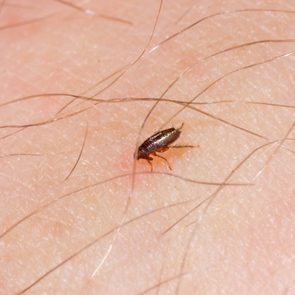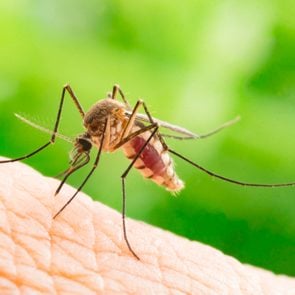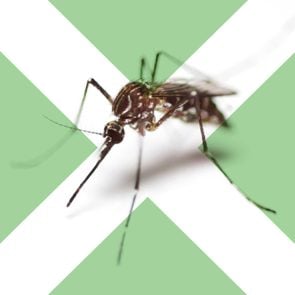How to Tell the Difference Between Fleabites and Mosquito Bites
Updated: Mar. 14, 2022
Scratching your head wondering whether it's a fleabite or a mosquito bite? Here's how to tell the difference—plus expert tips to stay safe.
Bug bites are bug bites, right? If you’re scratching a welt, does it really matter what chomped on you? Actually, it does if you want to avoid future bites and understand potentially life-threatening symptoms. Being able to tell the difference between, say, a fleabite, a bed bug bite, and a mosquito bite can mean the difference between an infestation (fleas, bed bugs) and figuring out whether the symptoms you’re experiencing might be due to a mosquito-borne illness. Here’s an expert guide to distinguishing between flea and mosquito bites.
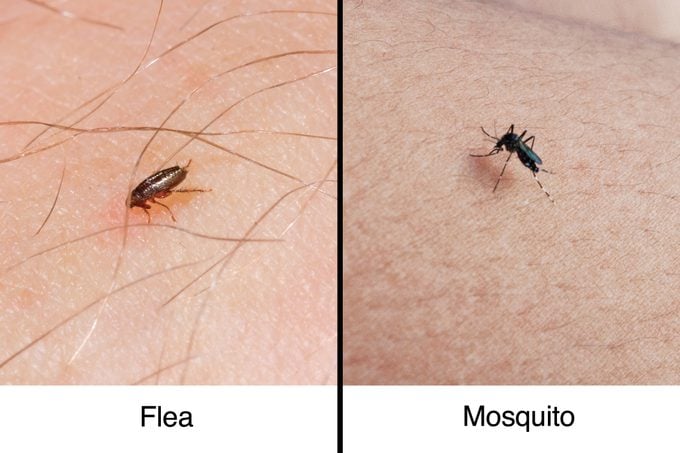
On This Page
Fleabites vs. mosquito bites
Mosquitos and fleas prefer the same warmer climates, and both of these pesky critters will suck your blood after a bite. (Keep an eye out for these dangerous bugs this summer.) However, there are important differences in how they strike (one jumps and the other flies), where they strike (fleas like to nibble on ankles, while mosquitos just go for exposed skin and love stinky feet). Don’t know which one bit you? Here’s how you can tell the difference between a fleabite and mosquito bite and what you can do about it.
Where you’ll find fleas
Because fleas thrive in warmer climates, they can be present the entire year in areas of the West Coast and the South, says Meghan Feely, MD, clinical instructor, dermatology, Mount Sinai Hospital, New York City. While they don’t have wings, they can jump up to eight inches. When it comes to hosts, fleas prefer mammals like dogs or cats, living up to eight days on short-haired cats and dogs and longer on long-haired animals, according to experts at Texas A&M University. The bugs can stay there for their entire life cycle or until they’re physically removed. It’s important to note that they can also attach themselves to humans.
Where you’ll find mosquitos
Similar to fleas, mosquitos do tend to prefer a warmer climate, but specifically hot, balmy weather. “Mosquitos don’t fly in the winter in northern areas,” says Coby Schal, Blanton J. Whitmire Distinguished Professor, Entomology & Plant Pathology, North Carolina State University, Raleigh. “Mosquitos start being active above about 50 degrees Fahrenheit but become most active when it’s hot and rainy (their larval development requires pools of water). They also tend to hang around places with standing water, from birdbaths to woodland pools. (Remove stagnant water and try these chemical-free insect repellents to keep bugs at bay.) Mosquito activity declines in fall when temperatures drop toward 50 degrees F.
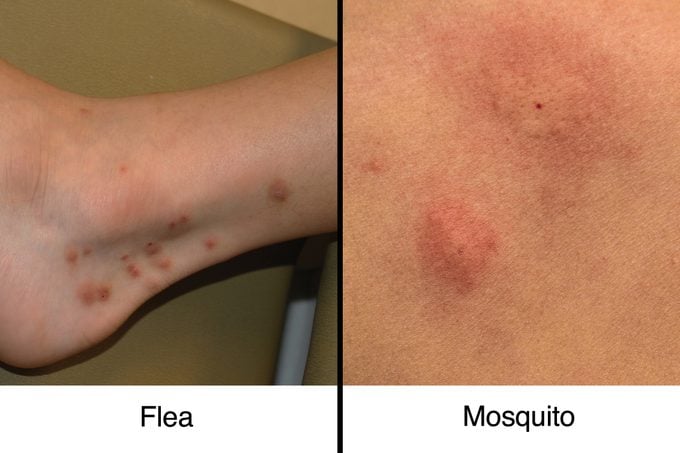
Fleabite and mosquito bite symptoms
Both fleabites and mosquito bites cause itching, but there are ways to tell them apart based on symptoms.
Fleabites
A fleabite can look like other insect bites, which makes it difficult to identify. Fleabites are small, reddish bumps (with a point in their center) that line up in rows of three or four, explains Bernard A. Cohen, MD, professor of dermatology and pediatrics, Johns Hopkins University School of Medicine, Baltimore. “This pattern is telltale,” he says. “We call it breakfast, lunch, and dinner.” Location matters, too. Fleas tend to strike your ankles and lower legs as this is an easy access point if they are jumping off the ground. (Fleas can jump up to eight inches.) If you have a dog or a cat, you are more likely to get fleabites.
Fleabites can cause intense itching that may drive you to distraction. They are mainly just a minor annoyance but can become infected, according to the American Academy of Dermatology (AAD). Some people experience itchiness soon after being bit by fleas, others may not experience any symptoms the first time they get bit by fleas, but may have a dramatic reaction the next time and the time after that. This is called fleabite delayed hypersensitivity disorder, Dr. Cohen explains. (Stock up on some of these products that will help you get rid of fleas for your pets and your home.)
Mosquito bites
A mosquito bite is marked by a smallish red, puffy area or welt, says Schal. Different species of mosquitos prefer to munch on different parts of the body, Schal says. “In general, they will bite any exposed skin, which is usually the legs, arms, and neck/face,” he says. There is some research showing that the feet are particularly attractive because of odors they emit.
Mosquito bites itch for a day or two, but they don’t bleed. (If the mosquito starts feeding and is swatted, blood can splatter, making it look like the bite bled.) Highly sensitive people can develop a welt after a mosquito bite. As they scratch the bite site, it can get infected, but this is rare. “People who don’t respond to bites show no sign of having been bitten,” he says. (Some people naturally attract mosquitos more than others.) “Other symptoms vary from none at all to severe allergic reactions that may require antihistamines,” he says. (These are nine things mosquitoes hate.)
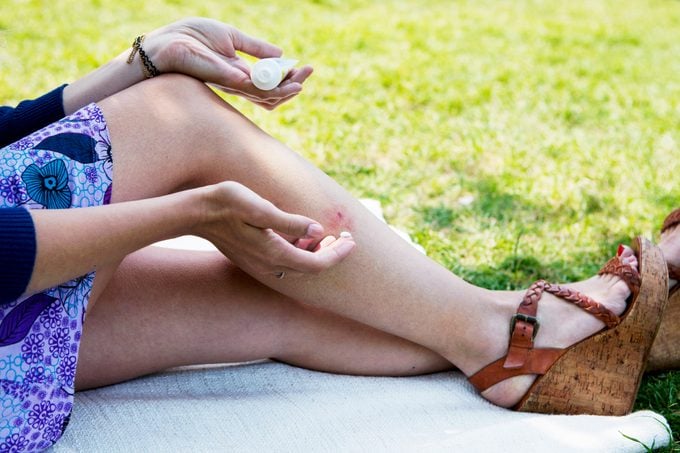
Treatment for bites
Fleabites
The AAD suggests applying an ice pack or an over-the-counter anti-itch cream, such as hydrocortisone, to fleabites. Another option is to take an over-the-counter oral antihistamine. (Here’s how to make your own DIY doctor-approved ice packs with things you already have in your house.)
See a doctor if:
If your fleabites become infected due to scratching, see your doctor. Signs of infection include pus, warmth, and tenderness. Oral or topical antibiotics can help. Fleabite delayed hypersensitivity reaction may also require a visit to your doctor. Treatment usually involves daily antihistamines to stop the itch and applying topical steroids to the bites. Fleas can also spread disease including the bubonic plague and typhus fever, according to the Centers for Disease Control and Prevention, but this is rare in the United States.
Mosquito bites
Topical treatment with hydrocortisone cream or calamine lotion will help relieve the itching associated with mosquito bites, Schal says. The Centers for Disease Control and Prevention adds that applying an ice pack for 10 minutes can reduce swelling and itching; reapply the ice pack as needed. (These natural remedies for itchy mosquito bites are worth a try.)
See a doctor if:
Mosquito bites rarely need medical attention. “It is extremely rare to have an anaphylactic reaction to mosquito bites,” Schal says. Signs include throat swelling, generalized hives, faintness, or wheezing. If any of these occur, it is a medical emergency. It is also rare for a mosquito bite to become infected, Schal says. But you may have an infection if itchy spots remain severe and anti-itch cream does not help, if the redness and welt get larger than a couple of inches or if the site becomes infected and oozes. (Be sure to read the do’s and don’ts guide to mosquito bites.)
There are several diseases you can get from mosquitos, some of which can be deadly. The yellow fever mosquito (Aedes aegypti), which lives in southern Florida and Louisiana, can carry Zika virus, chikungunya, Dengue, and other viruses, Schal says. The invasive Asian tiger mosquito (Aedes albopictus) is found farther north and can carry the same diseases. Culex mosquitos bite humans and birds and can carry the West Nile virus, and severe encephalitis.
“We have Anopheles mosquitos in the USA that carry malaria in other parts of the world but they are free of malaria here,” explains Schal. If you develop fever, fatigue, and muscle aches, or other symptoms that seem linked to a mosquito bite, it may suggest disease transmission, he cautions. (Here are 6 expert-approved ways to avoid getting bitten by a Zika virus mosquito.)
How to prevent bites
Fleabites
One way to prevent fleabites is by making sure that your dog or cat is on a steady prevention regimen. This may include a medicated collar, sprays, and pills. Talk to your vet about what is best for your four-legged friend. It’s also important to use an insect repellant that contains DEET 20 to 30 percent and make sure that skin is covered with clothing when spending time outdoors. Regular vacuuming can remove flea eggs (maturing pupae) from your carpet. “They can sit dormant for months to years, but when you come into a vacant house, the vibration sets off their hatching and within hours they are biting and looking for the life stage where they spin a silk-like cocoon and transition to the adult stage,” says Schal. (Here are some chemical-free bug repellants that actually work.)
Mosquito bites
Mosquitos need water to breed, explains Schal. If you want to keep them away, prevent the accumulation of water near your home. “Check and realign gutters to make sure they drain and get rid of water in containers around the house (toys, plant pots, children’s pools, birdbaths),” he says. (Don’t miss these 10 ways to prevent mosquito bites in your sleep.) You can also use repellent, especially in the early evening, and wear protective clothing. Keep them out of your house by repairing any holes in window screens, and sealing off other potential entry points. (Use these EPA-approved repellents on the skin.)




















